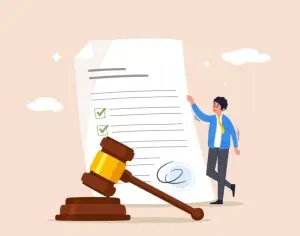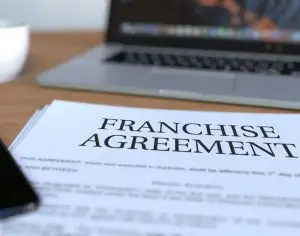The answer, in typical legal fashion, is yes… and no.
As a separate legal entity, third parties are generally unable to claim directly against a franchise company’s directors and shareholders for losses resulting from the company’s or directors’ (where acting in their capacity as directors) conduct.
However, that blanket of liability cover is lifted where directors act in breach of their duties. It is therefore essential to understand the scope of the duties and how directors should properly discharge them to avoid exposure to personal liability and risks to the franchise business as a result. Ignorance of the law is no defence.
It should also be noted that where the rights to operate a franchise business are acquired though a limited company (or limited liability partnership) a franchisor will invariably require the directors and shareholders (or members, in the case of an LLP) to provide a personal guarantee of the company or LLP’s obligations under the franchise agreement. This is standard practice as it helps to ensure that the key individuals have a vested interest in the franchised business and cannot at a later date simply seek to avoid liability under the franchise agreement by closing their company or LLP down and walking away.
What are your duties as a director?
There are seven statutory duties for directors set out in the Companies Act 2006, these are to:
- promote the success of the company by acting in the way the director considers, in good faith, to be most likely to promote the success of the company for the benefit of its members (i.e. shareholders) as a whole;
- act within the powers of the company (i.e. in accordance with the company’s articles of association);
- exercise independent judgement, including from other companies in the same group in which the person is also a director;
- exercise reasonable skill, care and diligence, taking into account: (1) the general knowledge, skill and experience that may reasonably be expected of a person carrying out the functions carried out by the director in relation to the company; and (2) the general knowledge, skill and experience that the director actually has;
- declare interests in any proposed or existing transactions or arrangements with the company (e.g. where a director of a franchise company is going to enter into a lease of a building which is owned by that director or a company owned by that director);
- avoid conflicts of interest (e.g. where the director of a company is also a director of a competitor franchise company); and
- not accept benefits from third parties which are given either because that person is a director or because that person does (or does not do) anything as a director (unless the benefit cannot be reasonably regarded as being likely to give rise to a conflict of interest, e.g. in the case of reasonable and proportionate corporate hospitality).
Directors have a range of other specific duties under common law and legislation, including:
- administrative duties relating to annual filings and maintenance of records;
- duties of confidentiality; and
- other statutory duties relating to health and safety, anti-bribery and corruption, competition law and the environment, which they should be aware of.
As soon as directors consider that their franchise company may be getting into financial difficulties, they should seek independent advice as there are a number of legal considerations for directors to take into account in such a situation. This is a point at which potential personal liability for directors becomes a real risk, along with the prospect of being disqualified from acting as a director or being involved in the promotion or management of a company for many years.
Directors may also have duties in relation to other roles or positions they might have (e.g. as employees) or in relation to a special relationship with shareholders (e.g. where the director is appointed by shareholders to represent their interests), but care should be taken to avoid any conflicts of interest between the roles to ensure compliance with the Companies Act 2006.
Who must comply with directors’ duties?
Directors’ duties apply not only to those people (or corporates) officially appointed as company directors, but also to anyone who regularly instructs the directors how to act. Given franchisors will often seek to monitor or control their franchisees to various extents (e.g. ensuring franchisees comply with franchise principles or requiring franchisor consent for certain proposed actions), franchisors should be careful to maintain effective separation between their business and franchisees’ businesses. Particular caution should be taken by franchisors in situations where franchisees are required to consult with the franchisor before taking certain actions.
Who are directors’ duties owed to?
Directors’ duties are owed to the company. Enforcement for breaches can therefore only be brought by the company, in certain circumstances by its shareholders (on behalf of the company) or a liquidator in an insolvency scenario.
Consequences of a breach of directors’ duties
Where a director is in breach of their duties, the company may seek a range of remedies against the director, including:
- damages, compensation and restoration of profits made by the director from the breaching conduct;
- injunctions to prevent the breach from persisting;
- setting aside the transaction or conduct causing the breach;
- restoring company property affected by the breach; or
- fines, including potential criminal fines.
For serious or persistent breaches, a director could face disqualification proceedings which could prevent them from acting as a director, or being involved in company management, for a prolonged period. As many franchise agreements require franchisee directors to remain a director of the franchisee at all times, there is a risk that breaches of directors’ duties may lead to the termination of the franchise agreement. Franchisee directors should also be wary as franchise agreements often permit the franchisor to terminate where the franchisee company’s directors are convicted of criminal offences or behave in such a way that could bring the franchisor’s reputation into disrepute. Equally, franchisors should ensure that they have contractual protections in place to protect the brand from reputational risk should franchisee company directors act in breach of their duties.
Conclusion
Neither franchisors nor franchisees should overlook directors’ duties as failure to abide by them can jeopardise a franchise business in addition to incurring personal liability for the directors. While the consequences of breaching directors’ duties may be significant, proper discharge of them provides a shield (subject to any contractual arrangements) from personal liability for the company’s debts and obligations. Whether their companies are franchisors or franchisees, directors should take steps to inform themselves of their responsibilities and, where appropriate, seek training or relevant legal and other professional advice to ensure they can make decisions for the benefit of their businesses without fear of recourse against their personal assets.
Written by Jonathan Steele with special thanks to Daniel Keleghan.


































